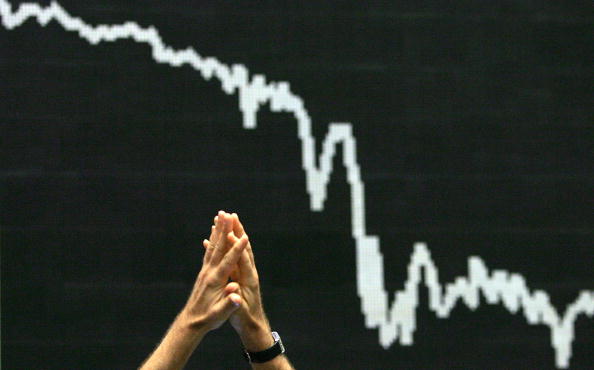City reacts as no-deal Brexit risk looms and pound staggers

As the political feud intensified in Westminster this afternoon over Boris Johnson’s decision to suspend parliament, over in the Square Mile investors have been reacting to the latest twist in the Brexit drama.
The Prime Minister’s plans to suspend parliament sent the pound sliding, while shares in UK airlines and housebuilders – which are typically vulnerable to Brexit uncertainty – also sank.
Read more: Brexit: Queen approves prorogation request
But how have today’s developments changed the forecasts of economists and analysts in the City? Is a no-deal Brexit more likely? Is the UK heading towards an election? And how are markets likely to react in the coming weeks?
UBS: All still seems like noise
Dean Turner, an economist for UBS Wealth Management, said: “In reality, all that happened was that we gave back gains we picked up over the last few sessions. My take on all of this is that it’s not increasing the chances of no-deal as of yet. What it does do is focus the mind of those MPs who wish to block no deal – they’re going to have to move more decisively and more quickly and perhaps explore the no-confidence route.”
He told City A.M.: “For those of us that spend most of our waking hours thinking about this, it all still seems like noise.”
RBC: No-deal Brexit more likely
Yet according to analysts from the Royal Bank of Canada (RBC), the effect of this morning’s UK news has been to push the probability of no deal exit to a new high of 44 per cent.
In a note this morning RBC chief currency strategist Adam Cole wrote: “Today’s developments make exit with no deal marginally more likely (and some will say reveal a government preference for no deal), but it is still far from a certain prospect while parliament has possible routes to block it and while the possibility (albeit slim) still exists that Johnson could extract a deal from the EU that parliament can support.”
ING’s development markets economist James Smith also said he thinks a no-deal Brexit “has become more likely”, although he still narrowly expects a “no-confidence vote, which leads to an Article 50 extension and early elections, remains the most probable scenario.”
AXA IM: Fundamentals have not changed
Gilles Moëc, group chief economist at AXA Investment Managers, said that the firm’s fundamental view has not changed: “It is unlikely that any positive outcome on Brexit – such as a “deal”, an extension or even a second referendum – can occur without the UK – and UK assets – first going through an exacerbation of the current crisis sentiment.”
“It is not constitutionally absolutely clear that those in parliament refusing a “no deal” can actually, within the current time limits, impose their view on the government, just as it is also unclear whether changing the “backstop” would be enough for the Eurosceptic wing of the Tory party to support a new “deal” sponsored by Boris Johnson.”
Berenberg: Flaws in PM’s strategy
Berenberg chief economist Holger Schmieding said that there are three flaws with the logic that the EU would be more willing to cave if they take Johnson’s threat of a hard Brexit more serious:
Read more: Boris’s Brexit blindside: What happens next?
1. The EU is already taking the hard Brexit risk seriously.
2. Even if Johnson tries to ramp up the pressure, the much bigger EU would still believe that the UK has much more to lose from a hard Brexit than the EU.
3. The move strengthens the EU suspicion that Johnson’s prime motive is to win snap elections shortly after Brexit rather than to conclude a deal with the EU
Schmieding added: “Suspending parliament would accentuate the hard Brexit risk and the UK’s constitutional crisis. In a way, a need for a Prime Minister to suspend his own parliament because he seems to lack a majority for his key policy – the approach to Brexit – is not exactly a sign of strength, to put it mildly.”